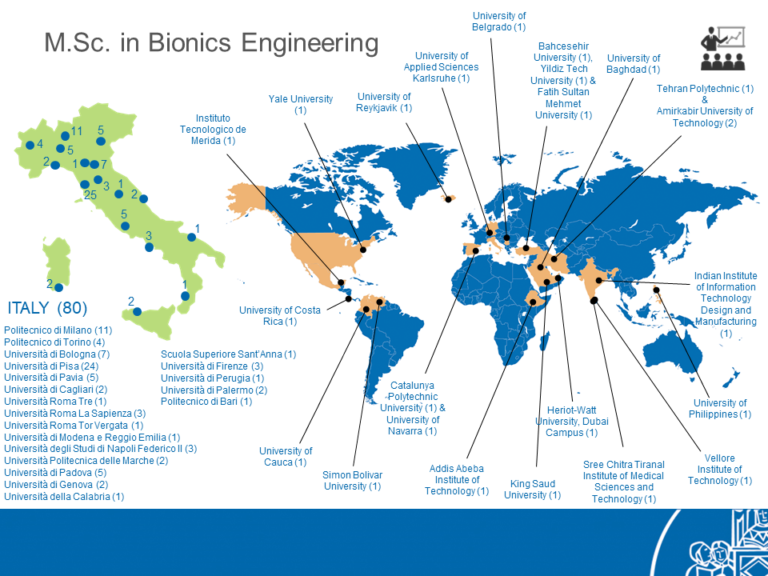The Master of Science in Bionics Engineering is a two-year program, jointly delivered in English by the University of Pisa (UNIPI) and Scuola Superiore Sant’Anna (SSSA). The M.Sc. belongs to the class LM – 21 of Italian university degrees (Biomedical Engineering). Chalk and hands-on courses take place in the classrooms and laboratories of the School of Engineering of UNIPI and at The BioRobotics Institute of SSSA.
In the progress of their studies, the students will gather fundamentals of science and technology of biorobotics and neural engineering. They will be also progressively trained to a multi-disciplinary research attitude by means of a fruitful dialogue with scientists from different research fields, such as medicine, biology, neuroscience, as well as with clinicians in the field of rehabilitation and surgery, pioneers of emerging industrials sectors and social scientists. Eventually, the students will enrich their background with specific skills in the following engineering domains:
- mechatronics,
- robotics,
- biomedical robotics,
- micro/nano technologies
- telerobotics,
- biomimetics and bio-inspired design of robotic platforms,
- neuroprostheses,
- wearable and implantable technologies, and
- advanced simulation environments.
The vision is that modern bionics engineers shall be able to address the entire process leading to the development of a new bionic device, i.e., moving from the user needs to the design, development and validation in a relevant environment of a prototype. Grounded on this vision, the course will be mastered as a balanced mix of theoretical/traditional classes, hands-on sessions, and research activities in world-class research laboratories. In particular, the students will be challenged with experiences such as:
- Design, development and testing of social robots and smart environments for assisted living, active ageing and wellbeing;
- Design, development and testing of neural prostheses, based on of the use of neural tissue engineering and neural interfaces;
- Design, development and testing of artificial and bioartificial organs;
- Development of systems able to mimic the natural senses;
- Design, development and testing of micro/nano robots;
- Analysis of brain functions and development of novel methodologies for processing brain images;
- Design, development and testing of bio-inspired and/or biomimetic robots that are capable of reproducing both human and animal functions;
- Design, development and testing of advanced prosthetic and orthotic devices for movement assistance and rehabilitation of disabled persons;
- Design, development and testing of miniaturized systems for minimally invasive therapy and regenerative medicine;
- Design, development and testing of advanced biomaterials for novel implantable human-robot interfaces;
- Design, development and testing of advanced methodologies for collecting and processing bio-signals.
At the end of the two-year program, the degree is conferred to students who fulfill the didactic requirements and pass a final examination based on thesis dissertation. Master theses in collaboration with industries or foreign universities are possible and highly encouraged.

